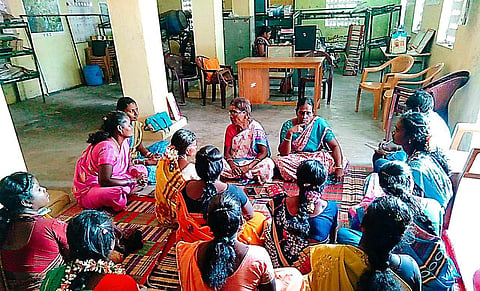

CHENNAI: About a decade ago, Amulu remembers being curled up on the sand outside her tarpaulin tent after being kicked by her boss. This happened moments after her boss took a burning log of firewood and burned her then 14-year-old daughter’s palm. Her husband was hit by a cane used to hit cows for jumping to their defence.
“All this happened because my daughter, who suffered a fever that day, left work at 4 pm instead of 8 pm,” Amulu says. Along with four other families, hers was bonded into labour at a wood-cutting unit near the Chennai airport. Bringing her daughter to that unit was the biggest mistake she committed in her life, she rues. “We discontinued our daughter from eighth standard because our owner said my other children, who were barely toddlers then, could not do enough work.
He went to my village along with my husband and brought my daughter here,” she says. Her family of six stayed in a house, with a metal roof and plastic sheets, located inside the marshes and bushes in Pallavaram. Amulu and her husband chopped wood and her children had to gather and dethorn it. Every week, the five families had a target of chopping 12 tonnes of wood. Each week, each family was paid Rs 200. “The marshes were the bane of us.
During the day, leeches, which bored through our clothes bit us and at night, it was mosquitoes. We had no water or electricity. We bathed once every three days and were lucky if we had water to cook three days in a row,” she says. Amulu, who is still learning to count, says they endured this for “five Pongals”.
After being rescued from the unit in 2015, Amulu and her husband continue to chop wood for a living. However, they are paid about Rs 2,500 a week more than 10 times what they earned previously; and their children are no longer unpaid bonded labourers, but literate.
Amulu was enrolled in a self help group called Makkal Kattral Maiam, which helps rescued female bonded labourers manage their finances independently. The groups are assisted by the Tamil Nadu State Rural Livelihood Mission. S Thiraviyam, who heads the programme, told Express that all members paid Rs 110 a month and could borrow money when they urgently need it. “This way we could prevent them from taking loans from exploitative landlords,” she says. Members who take loans have to repay it with low interest. However, financial calculations were fair.
There are 19 such groups of women in Kancheepuram and Chengalpattu alone and each group has about 10 women. “We first send trained volunteers from tribal communities to manage the finances of these self help groups. But one person from each group is necessarily trained to run that group independently,” said Thiravayam. The aim of the groups is to spread numeracy among rescued female bonded labourers and make them aware of the importance of their children’s education. “No woman in our groups gets their children married under the legal age. This was a rampant problem earlier.
We make sure that every child gets education and offer skill training to them,” she said. In order to be not exploited, the women of the house must be aware of their surroundings and for that they need education, opines Thiravayam. “I tell them they are equals. And that they will be better, only than themselves, if they educate their children,” she declares.
While Amulu’s oldest daughter lost her chance at education, her other three children are enrolled in school. Her second daughter, Kastrui who studies Class 11, told Express that she will be a doctor someday. “Unlike my friends, I did not attend primary school as I was taken away to work with my parents. But I will pursue higher education,” she says.